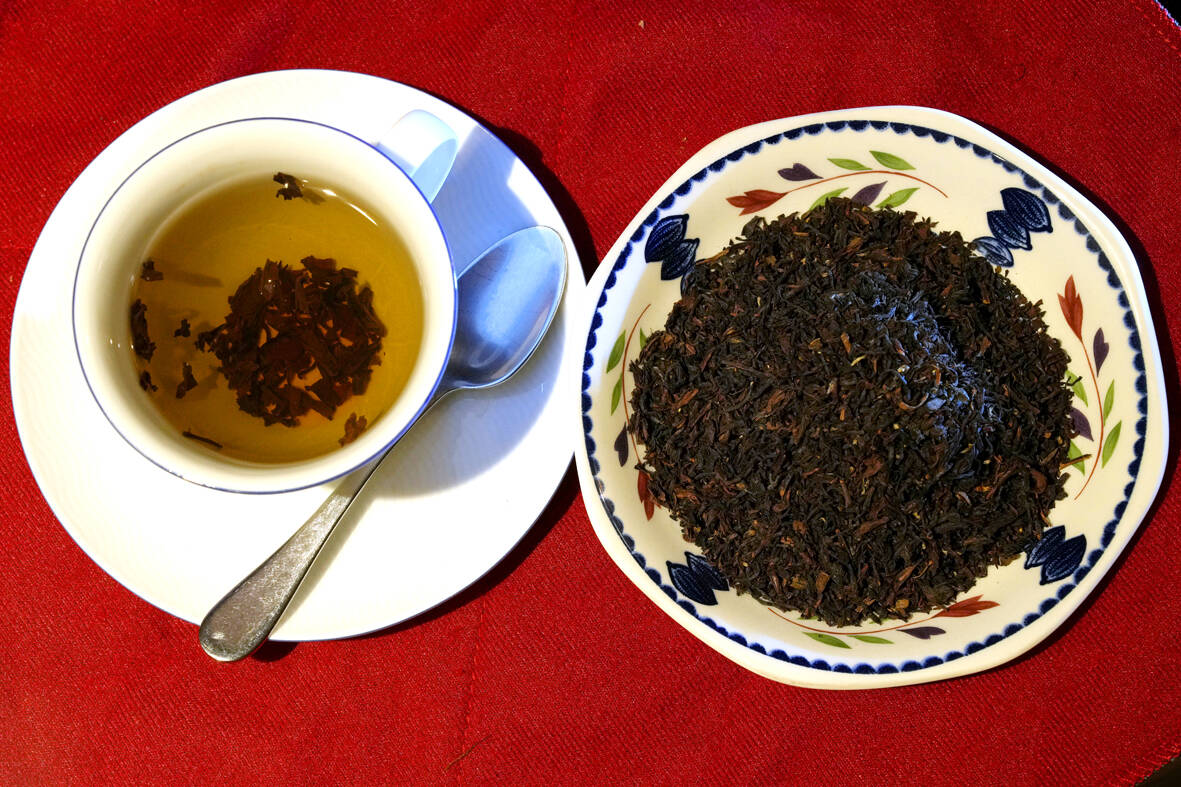Drinking plenty of tea — at least four cups a day — can help reduce the risk of developing type 2 diabetes, research has found.
Chinese academics behind the findings say that four or more cups of tea daily can lower the risk by 17 percent over 10 years.
“Our results are exciting because they suggest that people can do something as simple as drinking four cups of tea a day to potentially lessen their risk of developing type 2 diabetes,” said Xiaying Li from the Wuhan University of Science and Technology in China, the lead author.

Photo: AP
The protective effect may be even greater if people put milk in their tea, Li said. Although she and her seven co-authors did not investigate the effect of milk in tea as part of their work, previous studies have shown that dairy products can also have an anti-diabetic effect.
“I think the milk would make the effect of tea on diabetes stronger. That is, tea would be more effective with milk in,” Li said.
She will present the findings on Sunday at the European Association for the Study of Diabetes’s annual meeting, in Stockholm, Sweden.
The researchers undertook a meta-analysis of 19 previous studies into tea drinking and diabetes which involved almost 1.1 million adults in eight countries in America, Asia or Europe. They found a “significant linear association” between drinking black, green or Oolong tea — a traditional Chinese tea — and a reduced risk of becoming diabetic.
Compared to non-tea drinkers, people who drank one, two or three cups a day had a 4 percent reduced risk — but those who consumed four or more cups daily were at 17 percent less risk. The effect was consistent across both sexes.
Asked why tea might protect against diabetes, Li said: “It is possible that particular components in tea, such as polyphenols, may reduce blood glucose levels, but a sufficient amount of these bioactive compounds may be needed to be effective.”
About 4 million Britons have been diagnosed with diabetes. Of those, about 90 percent have type 2, which is associated with unhealthy lifestyles, especially being overweight. The others have type 1, an autoimmune condition that is not associated with lifestyle and is usually diagnosed in childhood. Although the findings have not appeared in a medical journal they were peer reviewed by the Stockholm conference organizers.
Li said that while the findings are observational and do not prove that tea drinking causes the lower risk of type 2 diabetes, they believe it is likely to contribute.

June 9 to June 15 A photo of two men riding trendy high-wheel Penny-Farthing bicycles past a Qing Dynasty gate aptly captures the essence of Taipei in 1897 — a newly colonized city on the cusp of great change. The Japanese began making significant modifications to the cityscape in 1899, tearing down Qing-era structures, widening boulevards and installing Western-style infrastructure and buildings. The photographer, Minosuke Imamura, only spent a year in Taiwan as a cartographer for the governor-general’s office, but he left behind a treasure trove of 130 images showing life at the onset of Japanese rule, spanning July 1897 to

One of the most important gripes that Taiwanese have about the Democratic Progressive Party (DPP) is that it has failed to deliver concretely on higher wages, housing prices and other bread-and-butter issues. The parallel complaint is that the DPP cares only about glamor issues, such as removing markers of Chinese Nationalist Party (KMT) colonialism by renaming them, or what the KMT codes as “de-Sinification.” Once again, as a critical election looms, the DPP is presenting evidence for that charge. The KMT was quick to jump on the recent proposal of the Ministry of the Interior (MOI) to rename roads that symbolize

On the evening of June 1, Control Yuan Secretary-General Lee Chun-yi (李俊俋) apologized and resigned in disgrace. His crime was instructing his driver to use a Control Yuan vehicle to transport his dog to a pet grooming salon. The Control Yuan is the government branch that investigates, audits and impeaches government officials for, among other things, misuse of government funds, so his misuse of a government vehicle was highly inappropriate. If this story were told to anyone living in the golden era of swaggering gangsters, flashy nouveau riche businessmen, and corrupt “black gold” politics of the 1980s and 1990s, they would have laughed.

In an interview posted online by United Daily News (UDN) on May 26, current Chinese Nationalist Party (KMT) Chairman Eric Chu (朱立倫) was asked about Taichung Mayor Lu Shiow-yen (盧秀燕) replacing him as party chair. Though not yet officially running, by the customs of Taiwan politics, Lu has been signalling she is both running for party chair and to be the party’s 2028 presidential candidate. She told an international media outlet that she was considering a run. She also gave a speech in Keelung on national priorities and foreign affairs. For details, see the May 23 edition of this column,